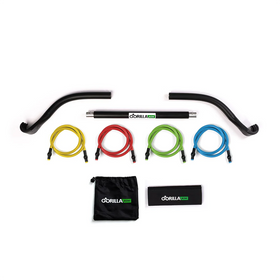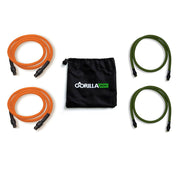Does Exercise Boost Your Immune System? And How Much?

Every day, your immune system works hard to fight off viruses, bacteria, toxins, and more. And, overall, it does an excellent job. But our bodies aren’t foolproof, demonstrated by the fact that illness and disease still happen. This leads many to wonder if lifestyle changes like exercising more can improve immune function.
Does exercise boost your immune system? That’s the question we’ll be exploring here. Let’s look at how exercise might help your immunity and the ideal amount of activity needed for good health.
Can Exercise Boost Your Immune System?
Although we still have a lot to learn about the connection between exercise and immunity, working out contributes to better health, which also means a healthy immune system.
According to Harvard Health, regular exercise:
- Lowers blood pressure
- Supports your heart health
- Helps you stay at a healthy weight
- Protects your body from many diseases
Exercise also changes your body’s white blood cells and antibodies, causing them to circulate faster. According to MedlinePlus, this might allow your body to detect and fight off illness earlier. However, this is just one theory.
Exercise and Stress
Moving your body can also help it deal with stress, which is linked to poor immunity. One meta-analysis looking at over 300 studies found that chronic stress (lasting from a few days to a few months) decreased all elements of immune health.
Thankfully, research has shown that people feel calmer for hours after 20-30 minutes of aerobic exercise. Exercising can help you better manage stress, which helps boost your immune system.
Exercise and the Immune Response
Regular exercise might also help boost the immune system’s response to vaccines. Studies have shown that exercising right before getting a vaccine strengthens the body’s immune response.
A 2020 review also found that inactivity and obesity can decrease immune function while a healthy lifestyle (including exercise) can help improve immune activity. In the context of illnesses like COVID-19, exercise and other healthy habits can help improve recovery from upper respiratory tract infections. This seems to be especially true for those who started exercising after being sedentary.
One thing is clear: staying active is one critical piece in the healthy lifestyle puzzle.
As we touched on above, your immune system is complex. We still have a lot to learn, but the most updated evidence points to the importance of exercise for overall health and immunity.
How Much Exercise Is Good for the Immune System?
It seems that a moderately active lifestyle is the most realistic (and beneficial) for most people. The review mentioned above found walking briskly for 30 to 60 minutes almost every day might help boost your body’s immune defense.
Walking is not the only option, though. You have many options when it comes to physical activity.
The Centers for Disease Control and Prevention (CDC) says you need this much activity:
- At least 150 minutes per week of moderate-intensity physical activity, such as walking, biking, swimming, or gardening — anything that gets your heart rate up OR
- At least 75 minutes per week of vigorous-intensity physical activity, such as running, jogging, playing basketball, or swimming laps AND
- At least two days a week of muscle-strengthening activity that works all major muscle groups, such as weight training or resistance training
You can also do an equivalent combination of moderate- and vigorous-intensity activities.
This could look like exercising 30 minutes a day for five days a week. It doesn’t really matter when or where you exercise as long as you spread it reasonably and meet the weekly guidelines.
We recommend making exercise as easy as possible to start wherever you are. An all-in-one system like the Gorilla Bow or Gorilla Bow Travel can take you through a full-body workout anywhere and at any time.
You don’t have to think too hard about what to do for your workout (or be too worried about how you’ll look at the gym — a common concern for many). Just choose a workout and start from the comfort of your own home or hotel room.
Be Careful About Overdoing It
While moderate exercise can boost your immune system, there is a catch: working out too much may have the opposite effect.
According to a 2015 review, exercising over 300 minutes per week for prolonged periods can “depress immunity.”
Intense exercise can stress the immune system, leading to fewer white blood cells that fight infections. As this happens, cortisol in the body can also increase and interrupt immune function.
In fact, athletes who over-train and don’t take time for recovery are more likely to get colds or the flu than those who aren’t overdoing it.
What are we talking about when we say “long-term, intense exercise”? Some examples could be:
- Intense gym training
- Very long-distance running, such as marathons
- Cycling at ten mph or faster
- Extreme sports training
Most of us don’t need to worry about overdoing exercise, as the average person struggles to get enough movement in their days. However, those who regularly engage in intense activity levels should be careful to avoid overtraining. Remember that rest and recovery are just as important as staying active.
What Exercises Boost the Immune System Best?
So, does exercise boost your immune system? We now know that yes, moderate exercise is good for your immune system. But is there a type of exercise that’s best for your immune system?
We don’t have a definitive answer, as the research is limited. Overall, meeting the guidelines for weekly activity seems to be the most effective approach.
Here are just a few examples of moderate exercise that’s good for your immunity long-term:
- Brisk walking
- Weight training
- Resistance training (like Gorilla Bow)
- Pushing a lawnmower
- Gym circuit training
- Bike riding
- Water aerobics
- Playing tennis
- Gardening
Any exercise is better than inactivity, so focus on getting in your daily workouts, which should include both aerobic and non-aerobic exercise throughout the week, not overdoing it, and taking care of your entire body and mind as best you can.
Can Exercise Prevent a Cold or the Flu?
Some research has shown that moderate-intensity exercise might reduce the number of colds you get. WebMD specifically mentions two studies where movement seemed to help immunity:
- A study in the American Journal of Medicine found that regular walking might increase white blood cells in the body. Women who walked for 30 minutes daily for a year had 50% of the number of colds as women who didn’t exercise.
- Another study found that 65-year-olds who exercised regularly had the same amount of specific white blood cells as people in their 30s.
This makes sense in the context of everything we’ve talked about in this article. Exercising helps keep your immune system strong and better at fighting foreign invaders like infections.
New research has even shown exercise might help prevent severe COVID-19 infections. The study also found that those who exercise less than 10 minutes per week were more likely to land in the ICU from COVID-19 symptoms than people who exercise at least 150 minutes per week.
What About Exercise When You're Already Sick?
If you’re already dealing with a cold or some other sickness, take it easy. Your immune system knows what to do, but it doesn’t need more stress.
It’s best to rest and let your body recover before jumping back into a workout routine. Talk to your doctor if you feel like you still need some movement — they can advise you what’s best for you.
If you have a fever, your body is currently fighting the infection. You’re more likely to be dehydrated and fatigued when you have a fever, and working out doesn’t help that. Give yourself time to recover so that you can feel better faster.
Other Precautions About Exercising While Sick
Light movement might be okay if you have a minor illness, such as a cold. However, keep in mind that some cold medicines can increase your heart rate. Trying to exercise while on these medications might lead to shortness of breath or other symptoms, so go easy.
Also, be careful if you usually exercise around other people. You don’t want to spread what you have to others. Again, if you have the flu, wait at least 24 hours after your fever breaks to go around others.
Other Ways to Support Your Immunity
Routine exercise is just one part of supporting your immune system. A healthy lifestyle overall — that includes exercise — is the best defense.
Besides working out regularly, here are some other healthy practices to help your immune system:
Combine Exercise with a Healthy Diet
What you put into your body can help support your immunity, and malnourishment increases the risk of contracting diseases. In addition, deficiencies in iron, zinc, selenium, vitamins A, B6, C, and E, and folic acid might also change immune responses.
So, you can help your body be at its best by eating well along with exercising.
Focus on eating a well-rounded diet, which includes:
- Leafy greens and other vegetables like kale, spinach, broccoli, Swiss chard, collard greens, bell peppers, cauliflower, mushrooms, squash, and onions
- Fruits like berries (such as blueberries, raspberries, or strawberries), apples, bananas, mangos, kiwis, watermelon, grapes, and avocado
- Healthy proteins, including plant-based proteins like beans, legumes, tofu, tempeh, and seitan, or animal-based proteins like fish, red meat, and poultry
- Healthy fats like nuts, seeds, olive oil, and coconut oil
- Whole grains like brown rice, quinoa, whole wheat bread, and whole-grain pasta
- Dairy products like milk, yogurt, and dairy-free alternatives
A healthy diet also means eating the correct range of calories for your body. If you exercise regularly and are trying to build lean muscle, you’ll need to eat slightly more calories. The specifics will depend on your body and goals.
If you struggle to eat healthily or worry about meeting your nutrient needs, consider a daily multivitamin to fill in the gaps. And, of course, talk to your doctor before starting any new supplement routine.
Understand Your Life Main Stressors
Everyone knows that they need to minimize stress. And everyone also knows that reducing stress is easier said than done. However, since stress does take a toll on your immunity, stress management is crucial.
It helps to start by identifying your primary sources of daily stress. Then, look for a few simple ways to ease the burden slightly. It might start with adding a few minutes of meditation, saying “no” more often, or making time for a daily workout.
Get Enough Shuteye
Sleep is essential recovery time for your brain and body. When you get enough sleep each night, it allows your body to maintain strong defenses.
Aim for at least seven hours of sleep a night. The government guidelines for adults range from seven to nine hours per night.
Be Careful with Substance Use
If you smoke, it’s best to stop as soon as possible. If you drink alcohol, be careful of how much — do so in moderation.
Maintain a Healthy Weight
Extra fat around the abs area can increase the risk of heart disease and other conditions, so maintaining a healthy weight for you is important. Thankfully, a daily exercise routine goes a long way towards reaching and maintaining that healthy weight.
Practice Good Hygiene
We all heard “wash your hands often” during the height of COVID, and it still applies now. Washing your hands frequently and practicing good daily hygiene helps prevent contracting or spreading disease.
Staying current with recommended vaccines also helps ensure your immune system is ready to fight infection.
What Is the Best Immune System Booster?
A combination of a healthy diet, moderate exercise, stress management, and good sleep is best for your immunity. There is no one “cure-all” to boost your immune system, but consistently healthy habits go a long way.
At Gorilla Bow, we want to make it as easy as possible to stay healthy alongside your busy life. That’s why we’ve developed a range of all-in-one resistance training bows to help you build muscle, lose weight, and work out with minimal joint stress. Grab your own Gorilla Bow today to support your immunity and overall health this year.

Sources:










Leave a comment